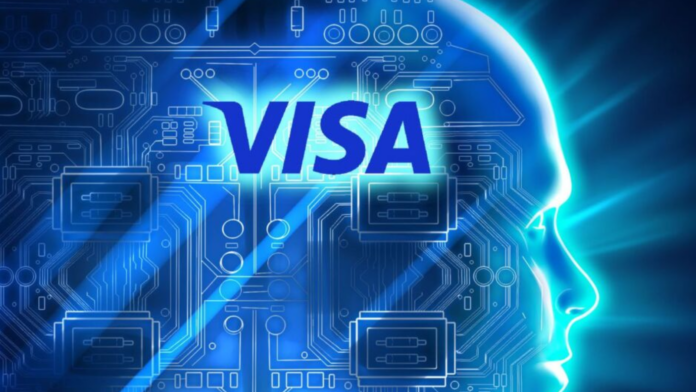Visa, the global payment giant, has announced a new $100-million generative AI initiative. This initiative aims to invest in companies that are focused on developing generative AI technologies and applications in the fields of commerce and payments. The investment will be curated by Visa’s global corporate investment arm, Visa Ventures, which has been actively supporting innovation in payments and commerce since 2007.
The potential of generative AI in the financial world
Generative AI is a type of AI technology that has the ability to produce various types of content, including text, imagery, audio, and synthetic data. This technology has shown great promise in tasks and content creation, and it is expected to reshape the way we live and work in the future. Visa’s Chief Product and Strategy Officer, Jack Forestell, believes that generative AI will also meaningfully change commerce, and it is important for us to understand the implications and applications of this technology in the financial world.
Visa’s History with AI
Visa’s early use of AI in payments
Visa has been at the forefront of AI adoption in the payments industry. As early as 1993, Visa pioneered the use of AI-based technology for risk and fraud management in payments. This early adoption of AI technology has allowed Visa to continuously improve its payment systems and provide secure and seamless experiences for its customers.
Visa’s real-time payment fraud monitoring solution
In 2022, Visa introduced its real-time payment fraud monitoring solution, Visa Advanced Authorization, which has been instrumental in preventing an estimated $27 billion in fraud. This AI-based solution uses advanced algorithms to analyze transaction data in real-time and identify potential fraudulent activities. By leveraging AI technology, Visa has been able to enhance the security of its payment systems and protect merchants and consumers from financial losses.
Introduction of VisaNet +AI suite
Visa also introduced VisaNet +AI, a suite of AI-based services aimed at improving settlement processes and resolving issues that arise in daily financial transactions. This suite includes innovative tools such as Smarter Stand-In Processing, which mirrors issuer approval decisions during outages to improve payment experiences, and Smarter Posting, which enables faster consumer payment experiences and reduces confusion caused by posting delays. By integrating AI technology into its operations, Visa has been able to streamline payment processes and enhance user experiences.
Visa’s Focus on Cryptocurrency
Visa’s plans for a crypto product
Visa has shown a strong interest in cryptocurrency technology and has plans to develop a new crypto product. This product aims to drive mainstream adoption of public blockchain networks and stablecoin payments. By embracing cryptocurrency technology, Visa hopes to provide its customers with more options for making secure and efficient payments and stay at the forefront of the evolving financial landscape.
Using cryptocurrency technology in payments
Cryptocurrency technology offers several advantages in the payments industry, including faster and more secure transactions, lower transaction fees, and increased transparency. By leveraging this technology, Visa aims to revolutionize the way payments are made and create a more inclusive and efficient financial ecosystem.
Generative AI Technology
Definition of generative AI
Generative AI refers to the use of artificial intelligence techniques to generate or create new content. This can include text, images, audio, and even synthetic data. Generative AI algorithms are trained on large datasets and then use that knowledge to generate content that is similar to what they have learned. This technology has shown great promise in content creation and has the potential to revolutionize various industries.
Capabilities of generative AI in content creation
Generative AI algorithms have the ability to understand and generate human-like writing, as demonstrated by major AI chatbots like OpenAI’s ChatGPT and Google’s Bard. These algorithms can generate high-quality, coherent, and contextually relevant content, making them valuable tools in content creation for businesses across different sectors.
Application of generative AI in commerce and payments
Generative AI has the potential to transform the way commerce and payments are conducted. It can be used to personalize customer experiences, create targeted marketing campaigns, and develop innovative products and services. Additionally, generative AI can help identify patterns and trends in large datasets, enabling businesses to make data-driven decisions and optimize their operations. Visa’s investment in generative AI reflects its recognition of the potential applications of this technology in the financial world.
Visa’s AI Investments
Visa’s commitment to supporting AI innovation
Visa has long been committed to supporting innovation in the field of artificial intelligence. The company recognizes the transformative power of AI and its potential to revolutionize various industries, including finance and payments. By investing in AI technologies and applications, Visa aims to stay at the forefront of these advancements and provide its customers with cutting-edge solutions.
Visa Ventures as a global corporate investment arm
Visa Ventures serves as Visa’s global corporate investment arm, responsible for identifying and investing in innovative technologies and startups. This arm of Visa focuses on supporting early-stage companies that are developing solutions in the areas of payments, commerce, and financial technology. Through Visa Ventures, Visa has been able to foster innovation, drive industry growth, and stay ahead of the competition.
AI Applications in the Payments Industry
AI’s impact on risk and fraud management
AI has had a significant impact on risk and fraud management in the payments industry. AI algorithms can analyze large amounts of transaction data in real-time and identify patterns and anomalies that may indicate fraudulent activities. By leveraging AI technology, payment companies like Visa can detect and prevent fraud more effectively, providing enhanced security for their customers.
Improving payment experiences with AI-based services
AI-based services have the potential to enhance payment experiences for both consumers and businesses. For example, AI-powered chatbots can provide instant and personalized customer support, improving customer satisfaction and reducing the need for human intervention. Additionally, AI algorithms can analyze customer behavior and preferences to offer personalized product recommendations, making the payment process more seamless and enjoyable.
AI’s potential to reshape commerce
AI has the potential to reshape the way commerce is conducted, offering new opportunities for businesses to connect with their customers and optimize their operations. AI-powered algorithms can analyze vast amounts of data to identify consumer trends, predict demand, and optimize pricing strategies. By leveraging AI technology, companies like Visa can gain valuable insights into consumer behavior and preferences, enabling them to make data-driven decisions and deliver personalized experiences.
Visa’s Role in Driving Innovation
Visa’s efforts in promoting innovation in payments and commerce
Visa has been actively involved in promoting innovation in the payments and commerce sectors. Through initiatives like Visa Ventures and its investments in AI technologies, Visa seeks to drive industry growth and foster the development of innovative solutions. By collaborating with startups and technology companies, Visa aims to stay at the forefront of technological advancements and provide its customers with cutting-edge payment solutions.
Bullish approach towards using cryptocurrency technology
Visa has taken a bullish approach towards leveraging cryptocurrency technology in payments. By embracing this emerging technology, Visa aims to provide its customers with more payment options, enhance security, and improve transaction efficiency. Visa’s focus on cryptocurrency reflects its commitment to staying ahead of the curve and embracing innovation in the ever-changing financial landscape.
Future Implications of Visa’s Investment
The significance of Visa’s investment in generative AI
Visa’s $100-million investment in generative AI reflects the company’s recognition of the significant potential of this technology in the financial world. By investing in companies focused on developing generative AI technologies and applications, Visa is positioning itself at the forefront of AI advancements in the payments industry. This investment demonstrates Visa’s commitment to driving innovation and providing its customers with cutting-edge solutions.
Potential advancements and developments in the payments industry
Visa’s investment in generative AI has the potential to drive advancements and developments in the payments industry. By harnessing the capabilities of generative AI, businesses can streamline processes, enhance user experiences, and gain valuable insights into customer behavior. This investment is likely to fuel innovation and create new opportunities for businesses to deliver personalized and efficient payment solutions.
The Intersection of AI and Payments
AI’s role in shaping the future of payments
AI is playing a pivotal role in shaping the future of payments. With its ability to analyze vast amounts of data, AI can provide valuable insights into customer preferences, optimize operations, and detect fraudulent activities. By leveraging AI technology, payment companies like Visa can deliver personalized and seamless payment experiences, transforming the way transactions are conducted.
Benefits and challenges of integrating AI in payment systems
Integrating AI into payment systems offers several benefits, including enhanced security, improved transaction efficiency, and personalized customer experiences. AI algorithms can detect and prevent fraudulent activities, analyze transaction data in real-time, and offer tailored recommendations to customers. However, integrating AI also poses challenges such as ensuring data privacy and security, addressing bias in algorithmic decision-making, and managing the ethical implications of AI technologies. It is crucial for companies like Visa to navigate these challenges and leverage AI responsibly.
The need for understanding AI’s impact on commerce
As AI continues to play a larger role in commerce, it is essential for businesses to understand its impact on the industry. AI technologies have the potential to disrupt traditional business models, reshape customer experiences, and create new opportunities for growth. By staying informed about AI advancements and embracing innovation, businesses can adapt to the changing landscape and leverage AI to their advantage.
Conclusion
Visa’s $100-million investment in generative AI signifies the company’s commitment to innovation and its recognition of the transformative potential of AI in the payments industry. This investment reflects Visa’s bullish approach towards embracing emerging technologies, such as cryptocurrency, and its dedication to providing its customers with cutting-edge solutions. With generative AI technology, Visa aims to reshape commerce, enhance payment experiences, and drive advancements in the financial world. As AI continues to shape the future of payments, it is crucial for businesses to understand and embrace this technology to stay competitive in the ever-evolving industry.












